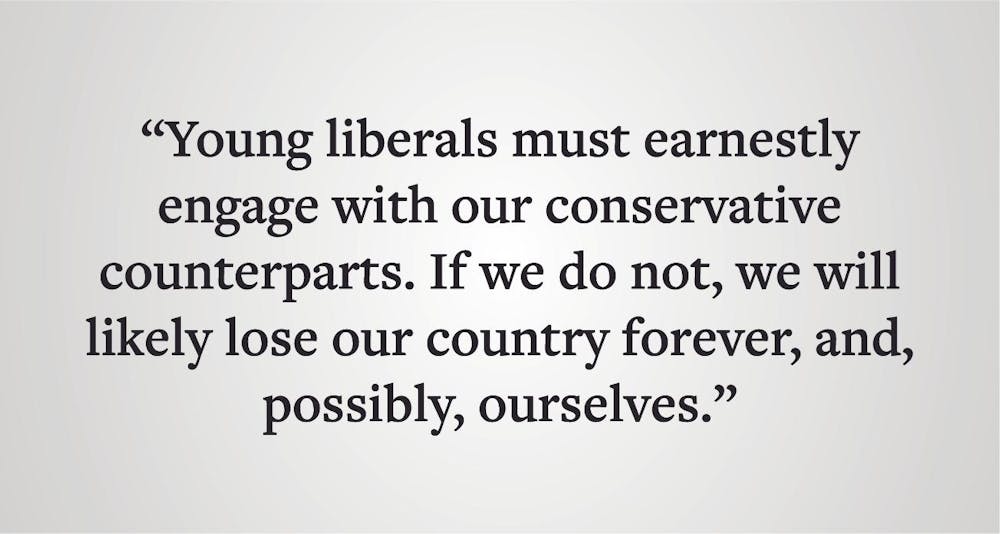Everyone is trying to figure out what happened in this year’s presidential election. How is it possible that Donald Trump secured such a decisive victory? I certainly don’t have all the answers, but I do know one thing: Americans don’t talk to each other. As a young, university-educated Democrat, I rarely engage in conversation with people who lead vastly different lives from my own. I fear that my experience is not singular and that this larger trend has led to a profound misunderstanding of who other Americans are and what they actually care about. It is, however, possible to create an ecosystem of cross-cultural dialogue. In fact, I’ve found that when conversations and spaces are approached or created with intention, they are often successful. Still, it is rare that they are allowed to emerge at all.
Last spring, during my final semester at Brown, I observed the problem firsthand. I rarely saw Jewish students with differing feelings towards the ongoing war in Israel and Palestine engaging with one another. Instead, I saw a deeply divided Jewish community — not to mention, campus.
In activist spaces, it’s all about action. At the time, an informal alliance had been formed between Jews for Ceasefire Now, Students for Justice in Palestine and the Brown Divest Coalition. Together, they called for an immediate ceasefire and divestment from companies profiting off the loss of both Palestinian and Israeli life. All groups expressed their shared commitment to those goals, but beyond this public agreement, I could feel the strange absence of dialogue.
For instance, I witnessed no discussion of the preferred fate of the Israeli state or about individuals’ opinions on Hamas and the methods they had employed on Oct. 7. Rather, there was a deafening silence.
Meanwhile, I attended some of the classes hosted by JFCN’s independent study project on Jewish nationalism, statecraft and political solidarity. While those in attendance engaged critically with course material, at the end of the day, I understood it as a space to foster awareness — not debate.
Together with my co-founder Zoey Fisher ’25, a regular member of Brown-RISD Hillel, I dreamt up a way to combat this absence of dialogue.
After spring break, we hosted our first Dinner In Progress, welcoming a group of 12 Jewish students with the goal of expanding to more communities in the future. In our first meeting, we laid out the guidelines for conversation. We then posed a single prompt to each dinner guest: Tell us your story. What is your connection to Judaism, to Israel? Why are you here today?
In the next hour and a half, we made it around the table only once. Students shared their stories of growing up Jewish in America learning about Israel. They spoke about what it felt like to be on campus during a time of reckoning. By the end, the energy in the room was palpable. Tears had been shed, hearts had been opened and students were already asking if we could meet again.
And then came a large, campus-disrupting action: Over 100 students camped out on the Main Green in a Gaza Solidarity Encampment. I understood the encampment was a space for those united in action to ask for change and anticipated that vocal critics of their mission would not be welcome in that space. I saw this as another opportunity to facilitate constructive conversations. Coordinating with encampment organizers, and with the vital assistance of a few other like-minded Jewish students, I set up an open conversation blanket 50 feet away. Anyone could come by to ask questions about the encampment or voice their concerns about the students’ demands. Students, faculty and other Providence community members questioned the validity of the encampment, and we shared our various perspectives on its existence.
Our final Dinner In Progress came the next week.
For many Jews, learning about the Palestinian struggle or engaging with any anti-Zionist teachings can feel like a personal affront to family. Support for Israel is often instilled from a young age and tied to religious practice itself through synagogue or Jewish day school. I personally learned about Israel through the eyes of my Holocaust-survivor Oma. Support for Israel was less nationalistic or academic and more of an unspoken understanding.
It’s no surprise that most of us start in the “Zionist” camp by default. Most “anti-Zionist” Jews were not raised that way; instead, their understandings are often shaped by emotional life experiences. But within our Dinners In Progress, the flow of knowledge was not one-way. And as my time at Brown was coming to a close, the significance of this dawned on me.
In the current moment, spaces for dialogue are more important than ever — but they can’t be everything. Action, too, is necessary. We must demand change while engaging with opposing perspectives and refining how we ask for that change. When necessary, we must also reevaluate what change we seek.
Following SJP’s praise for Hamas’s attack on the one-year anniversary of Oct. 7 as a “historic act of resistance,” it became glaringly evident that students in activist spaces were missing the perspectives of their critical peers. We were wrong to avoid the questions that we were too afraid to ask. Young liberals must earnestly engage with our conservative counterparts. If we do not, we will likely lose our country forever, and, possibly, ourselves.
Asher Radziner ’24 can be reached at asher_radziner@alumni.brown.edu. Please send responses to this op-ed to letters@browndailyherald.com and other opinions to opinions@browndailyherald.com.





